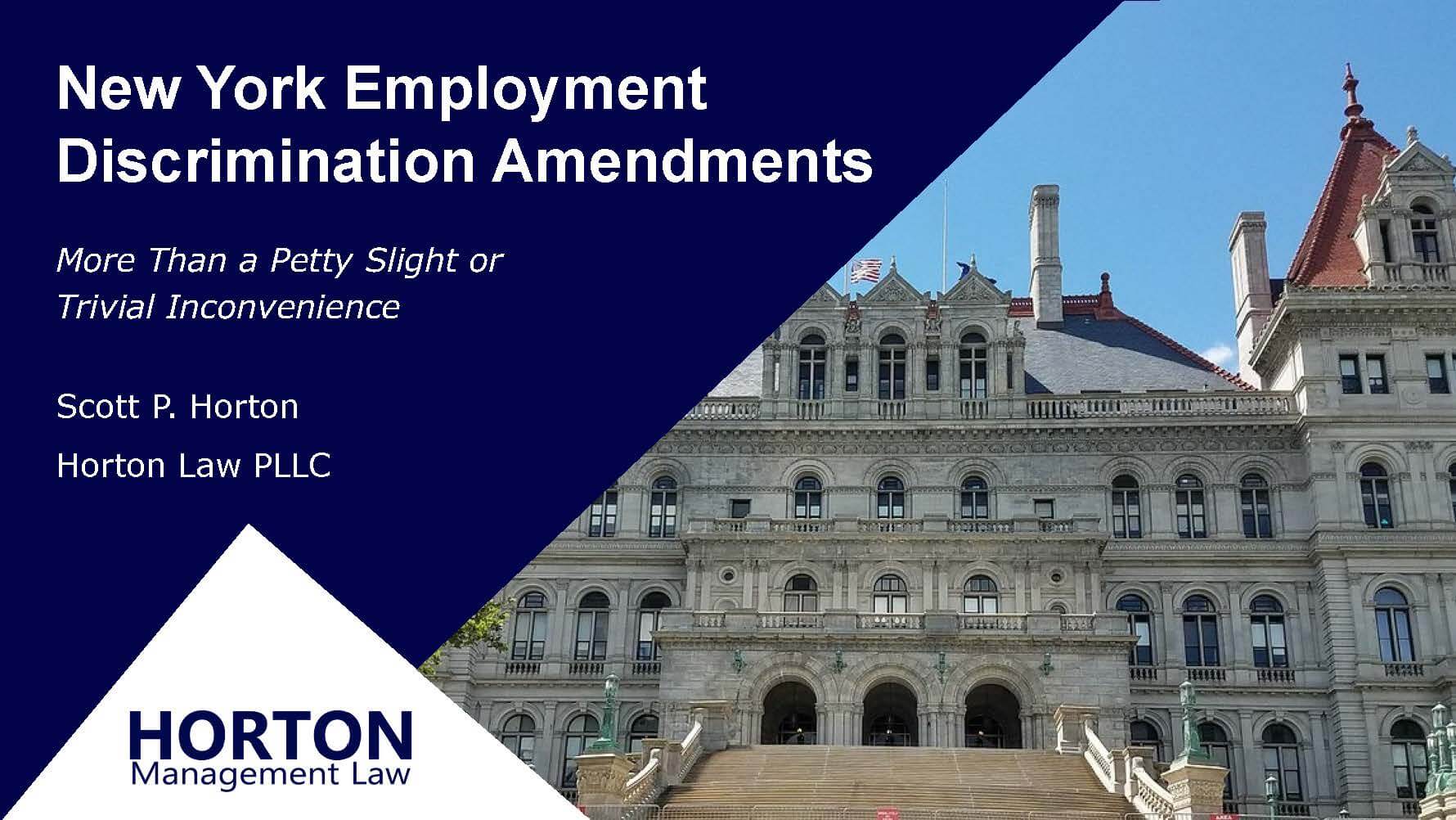On April 11, 2023, New York State implemented an updated model sexual harassment policy. The new policy includes several meaningful substantive additions. But a key employer concern remains unanswered. Are they required to change their policies to conform to the new model?
Sexual Harassment Policy Requirement
Since October 9, 2018, New York has required all employers in the state to maintain a written sexual harassment policy. They must also provide annual sexual harassment training to all employees.
Section 201-g of the New York Labor Law directed the Department of Labor (DOL) to consult with the Division of Human Rights (DHR) to develop a model sexual harassment prevention policy. However, the law does not specifically require employers to adopt the model policy. As an alternative, they may “establish a sexual harassment prevention policy to prevent sexual harassment that equals or exceeds the minimum standards provided by such model sexual harassment prevention policy.”
Based on the law and pre-existing guidance from the DOL, an employer’s policy must at least:
- Prohibit sexual harassment consistent with guidance issued by the Department of Labor in consultation with the Division of Human Rights.
- Provide examples of prohibited conduct that would constitute unlawful sexual harassment.
- Include information concerning the federal and state statutory provisions concerning sexual harassment, remedies available to victims of sexual harassment, and a statement that there may be applicable local laws.
- Include a complaint form.
- Include a procedure for the timely and confidential investigation of complaints that ensures due process for all parties.
- Inform employees of their rights of redress and all available forums for adjudicating sexual harassment complaints administratively and judicially.
- Clearly state that sexual harassment is considered a form of employee misconduct and that sanctions will be enforced against individuals engaging in sexual harassment and against supervisory and managerial personnel who knowingly allow such behavior to continue.
- Clearly state that retaliation against individuals who complain of sexual harassment or who testify or assist in any investigation or proceeding involving sexual harassment is unlawful.
NYS Sexual Harassment Law Has Changed
The New York Human Rights Law was amended in 2019 to change the legal standard of workplace harassment. Among the changes, employees no longer need to prove that unwelcome conduct was “severe or pervasive.” That standard remains operative under the federal employment discrimination laws. But now, under the NYS law, to avoid liability employers must show that “the harassing conduct does not rise above the level of what a reasonable victim of discrimination with the same protected characteristic would consider petty slights or trivial inconveniences.”
Updated Model Policy
The law requires the DOL and DHR to review their model policy every four years. The first review took place in 2022, resulting in the updated model sexual harassment policy released in early 2023.
Not surprisingly, the new policy aims to advise employees on a broadened scope of what the DOL and DHR view as unlawful sexual harassment. However, new additions to the model policy are not limited to those arising from intervening statutory changes.
And the DOL hasn’t clarified the extent to which employers must update their existing policies, if at all. The specific minimum guidelines listed above haven’t changed. But there’s room for interpretation regarding the requirement to “Prohibit sexual harassment consistent with guidance issued by the Department of Labor in consultation with the Division of Human Rights.”
Header text on the State’s updated model sexual harassment states, “Employers are encouraged to tailor this policy to their individual needs, though as a minimum standard, no section in this policy should be omitted.”
The updated model policy is available for download from NYS here.
Description of Sexual Harassment
Consistent with the new statutory standard for proving harassment, the updated model sexual harassment policy includes the following;
Harassment does not need to be severe or pervasive to be illegal. It can be any harassing behavior that rises above petty slights or trivial inconveniences. Every instance of harassment is unique to those experiencing it, and there is no single boundary between petty slights and harassing behavior. However, the Human Rights Law specifies that whether harassing conduct is considered petty or trivial is to be viewed from the standpoint of a reasonable victim of discrimination with the same protected characteristics.
This additional wording is obviously based on the 2019 statutory amendment. Nonetheless, it is worth noting that the original New York model sexual harassment policy didn’t mention the “severe or pervasive” standard even when that was the prevailing law.
Gender Issues
The 2019 Gender Expression Non-Discrimination Act (GENDA) added “gender identity or expression” as statutorily-protected characteristics under the New York Human Rights Law. Before GENDA, the DHR had already interpreted the statutory category “sex” to include gender-related characteristics. Accordingly, the original model sexual harassment policy identified sexual harassment as including harassment based on “self-identified or perceived sex, gender expression, gender identity and the status of being transgender.”
The new model policy significantly expands its focus in this area, including the following passage:
Understanding gender diversity is essential to recognizing sexual harassment because discrimination based on sex stereotypes, gender expression and perceived identity are all forms of sexual harassment. The gender spectrum is nuanced, but the three most common ways people identify are cisgender, transgender, and non-binary. A cisgender person is someone whose gender aligns with the sex they were assigned at birth. Generally, this gender will align with the binary of male or female. A transgender person is someone whose gender is different than the sex they were assigned at birth. A non-binary person does not identify exclusively as a man or a woman. They might identify as both, somewhere in between, or completely outside the gender binary. Some may identify as transgender, but not all do. Respecting an individual’s gender identity is a necessary first step in establishing a safe workplace.
Bystander Intervention
The updated model sexual harassment policy includes a new section entitled “Bystander Intervention.” In addition to restating the pre-existing requirement that supervisors and managers must report sexual harassment, the policy now encourages “any employee witnessing harassment as a bystander” to report it.
The policy lists “five standard methods of bystander intervention”:
- A bystander can interrupt the harassment by engaging with the individual being harassed and distracting them from the harassing behavior.
- A bystander who feels unsafe interrupting on their own can ask a third party to help intervene in the harassment.
- A bystander can record or take notes on the harassment incident to benefit a future investigation.
- A bystander might check in with the person who has been harassed after the incident, see how they are feeling and let them know the behavior was not ok.
- If a bystander feels safe, they can confront the harassers and name the behavior as inappropriate. When confronting harassment, physically assaulting an individual is never an appropriate response.
Remote Employees
The new policy also specifically adresses the proliferation of remote work stemming from the COVID-19 pandemic:
Sexual harassment can occur when employees are working remotely from home as well. Any behaviors outlined above that leave an employee feeling uncomfortable, humiliated, or unable to meet their job requirements constitute harassment even if the employee or covered individual is at home when the harassment occurs. Harassment can happen on virtual meeting platforms, in messaging apps, and after working hours between personal cell phones.
Legal Protections
New York sexual harassment policies must include information about reporting alleged sexual harassment to government agencies, including the DHR and the U.S. Equal Employment Opportunity Commission. The new model policy includes several updates to these sections. For example, it now references a hotline introduced in 2022 that employees can call to speak with a volunteer attorney experienced in sexual harassment matters for “limited free assistance and counsel over the phone.”
Sexual Harassment Prevention Training
In addition to the new model policy, the State has also updated its model sexual harassment prevention training materials.
Like the model policy, the State’s training materials are not mandatory. But employers must provide annual training that meets certain minimum standards, which have not changed.
What Should New York Employers Do Now?
At a minimum, you should ensure that your organization has reviewed the new model sexual harassment policy (and training materials). There are some items that employers generally should update, such as the statute of limitations for filing sexual harassment claims with the DHR (which has increased from one to three years since the original model policy was issued). Other topics, including the elaboration of legal standards and gender identity principles, raise more complicated compliance questions. It is not clear whether you must adopt the new wording in these areas, since employers have some discretion in drafting their sexual harassment prevention policies. Thus, your company’s approach should be evaluated on a case-by-case basis, with consideration of whether you have previously adopted the model policy in its entirety or prepared your own alternative designed to satisfy at least the minimum standards.
For more employment law updates, sign up for the Horton Management Law email newsletter and follow us on LinkedIn.


